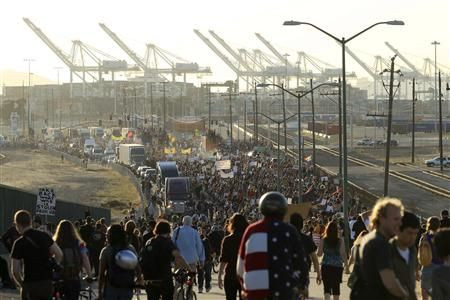New Tent City Being Built by Those Seeking to Occupy Oakland

Anti-Wall Street protesters took over a vacant lot and adjacent park in downtown Oakland on Saturday and erected a tent camp to replace one torn down by police, setting the stage for a potential showdown.
Protesters marched to the lot and tore down a chain-link fence before pitching tents as a light rain started. Police on the scene did not immediately intervene, and the camp later expanded into an adjacent public park.
Occupy Oakland has a new home at 19th and Telegraph, organizers said in a message to supporters, adding there would be a big housewarming party: Bring tents!
The move appeared to be a direct challenge to Oakland police, who less than a week ago forcibly dismantled a similar protest camp nearby, and risked igniting a confrontation. Police have said they would not allow another encampment.
Previous unrest surrounding protests in Oakland, a West Coast Occupy hot spot, has helped rally support nationwide for the Occupy Wall Street movement launched in New York in September to protest economic inequality and excesses of the financial system.
The lot and adjacent park are in a rapidly gentrifying area, and protesters said establishing a camp there would be a symbolic move in a city they complained looked out most for the interests of big business and developers over ordinary residents.
Oakland police had said they had a nonconfrontational strategy for preventing a new campsite from being established, but did not elaborate.
While peaceful forms of expression and freedom of speech will be facilitated, acts of violence, property destruction and overnight lodging will not be tolerated, police representative Johnna Watson said in a statement.
There were no immediate reports of arrests or violence.
Police on Monday evicted protesters from their camp in Frank Ogawa Plaza after weeks of indecision over how to deal with the protests, spurred to act after a fatal shooting nearby fueled pressure on the city to close the camp down.
I support the First Amendment of the U.S. Constitution, and I am a passionate supporter of freedom of speech. However, camping on city property -- whether it is in a park or in open space -- is illegal and won't be allowed, Mayor Jean Quan said in a statement on Friday.
An earlier attempt to remove the camp in October had sparked clashes between protesters and police that wounded a former U.S. Marine and evolved into one of the most violent episodes linked to the Occupy movement.
Call to Shut Ports
The Oakland protesters also announced plans to shut down all West Coast ports on Dec. 12, cooperating with protesters in Los Angeles. The Oakland group had briefly forced the northern California city's port to close earlier this month.
As a cold, wet night enveloped the new camp on Saturday, a few hundred protesters took shelter under a canopy of blue tarps and huddled in about 25 tents as police watched from a distance.
One man, pushing a shopping cart, passed out rocks and sticks just in case as organizers pleaded for protesters to stay and defend the encampment.
I think it's important to be able to show an ongoing presence. It's to show our physical numbers. It makes a visual statement, said Thandiwe Satterwhite, a Berkeley music teacher who carried a placard saying Do Not Disturb Occupants.
To the north in Davis, the University of California campus in that city said it would launch an investigation over video footage that appeared to show campus police using pepper spray against seated student protesters at close range.
Yesterday was not a day that would make anyone on our campus proud, UC Davis Chancellor Linda P.B. Katehi wrote in a public statement. The use of pepper spray as shown on the video is chilling to us all and raises many questions about how best to handle situations like this.
(Writing and additional reporting by Mary Slosson; Editing by Cynthia Johnston)
© Copyright Thomson Reuters {{Year}}. All rights reserved.





















